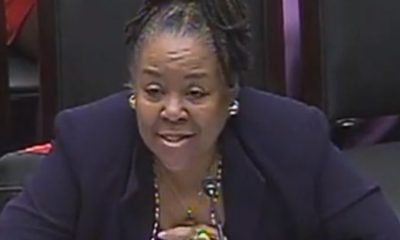#NNPA BlackPress
COMMENTARY: Panic buying adds additional stress in COVID-19 pandemic
NNPA NEWSWIRE — In some ways, the trend of panic buying is a way for people to take back control in uncertain times. Many psychologists have suggested that panic buying can be understood as playing to our three fundamental psychology needs in (1) autonomy—as in the need for control; (2) relatedness—better defined as “we shopping,” rather than “me shopping,” and (3) competence—whereby a level of accomplishment is achieved and making a purchase gives people a sense that they are “smart shoppers.”
You don’t need a year’s supply of toilet paper
By Merdies Hayes, Managing Editor, Our Weekly News
Panic buying has been rife around the globe in wake of the coronavirus pandemic. Customers have been stockpiling goods like hand sanitizer, bottled water, canned goods, paper towels and toilet paper.
The trend has seen stores in some nations ration products. The U.K. is limiting sales of hand hygiene products. Australians have seen restrictions on paper goods. Americans now have to wake before dawn to purchase cases of bottled water, which are now limited to two per customer.
America not alone in frenzy
America isn’t alone in experiencing empty shelves. Mass demand for rice and noodles in Singapore prompted Prime Minister Lee Hsien Loong to assure the public that there was enough to go around. In Auckland, New Zealand, supermarket spending shot up 40 percent in about 72 hours. Shoppers in Malaysia wanting to pad their “pandemic pantries” have driven an 800-percent increase in weekly hand sanitizer sales. All of these places have confirmed cases of coronavirus.
Psychologists explain this phenomenon as “retail therapy,” defined as when, where and what we buy to better manage our emotional state. Experts suggest that the answer may lie in a fear of the unknown and believing that dramatic events warrant a dramatic response — even though in this case, the best response is something as mundane as washing your hands for 20 seconds.
In some ways, the trend of panic buying is a way for people to take back control in uncertain times. Many psychologists have suggested that panic buying can be understood as playing to our three fundamental psychology needs in (1) autonomy—as in the need for control; (2) relatedness—better defined as “we shopping,” rather than “me shopping,” and (3) competence—whereby a level of accomplishment is achieved and making a purchase gives people a sense that they are “smart shoppers.”
Conflicting messages add to uncertainty
In the U.S., people initially received conflicting messages from the Centers for Disease Control and Prevention and President Donald Trump. It was no surprise that people were worried when one organization says the matter is urgent, and another says it’s under control. With the virus present in all 50 states, and daily life has been altered from coast to coast, an unexpected “fear contagion” has taken hold.
Often in times of uncertainty, people can enter a “panic zone” that makes them irrational and—in rare cases—borderline neurotic. In other disaster conditions like an earthquake, tornado or hurricane, people tend to prepare because they know how many supplies they will need. It’s hard to do that with a virus that scientists around the world are still learning about.
Peter Noel Murray, a New York-based member of the American Psychological Association and the Society for Consumer Psychology, is uncertain that persons in authority have the power to calm the panic-buying trend.
“On the emotional side, the answer is self-affirmation,” he said. “In our minds, we know one day we are going to be dead, and the mind deals with it through [seeking] control.” He said there is an “over-estimation” of fear and people’s minds need to respond to those kinds of feelings.
A need for ‘self-affirmation’
“The need for self-affirmation is triggered and that drives us to do unreasonable things like buying a year’s worth of toilet paper,” Murray explained. “It overwhelms the knowledge that we don’t need to be doing that.”
There is a difference in disaster panic and general panic. Toilet paper has become the symbol of the latter. For instance, weather forecasters are able to predict with much greater certainty that a hurricane is barreling toward a certain region. They can provide more information about a cluster of tornadoes about to come your way (though warning times are uncertain at best). With an earthquake, of course, there is little way of predicting that. In these cases, you know it is going to happen and you usually know ahead of time that the emergency will last a couple of days. You’re able to prepare yourself by being somewhat rational with what you buy.
In public health issues we have no idea about the duration and or intensity. Therefore, the messages we receive daily may encourage some to go into panic mode and purchase far more than needed because it’s often the only way to maintain a sense of control.
But why purchase huge amounts of toilet paper? Dr. Dimitrios Tsivrikos, an expert in consumer and behavioral science at the University College London, has for the past few months witnessed this phenomenon and offered an unexpected assessment:
“Because toilet paper has a longer shelf-life than many food items,” he said. “And it’s prominently featured in aisles and is big in size. We’re psychologically drawn to purchasing it in times of crisis. It’s in big colorful packages; the bigger they are, the more important we think they are.”
Take precautions, but don’t panic
While the threat is very real and all precautions should be taken to stay healthy, some shoppers may overestimate the risks of dying from coronavirus. Katharina Wittgens, a psychologist with the behavioral strategy agency Innovation Bubble, suggests that shoppers are creating too much anxiety in themselves, which is never good during either clear or uncertain circumstances.
“Far more people die in car accidents or household accidents per year, but we don’t panic in the morning before we go to work about these things,” Wittgens said. “It’s hard to convince our brains of facts, hence why statistics often don’t work.” Wittgens said the surge in panic buying will probably decline after a month when people have had time to think more rationally.
“When we stand in front of empty shelves, people fear that stocks will run out, so they buy far more than they need,” she said. “This becomes dangerous as some goods such as soap, medicines and sanitizers become unavailable for those in immediate need.” And because it is more obvious when the paper goods aisle is empty—compared to smaller items—this can also lead to craze over the item intensifying.
There have been plenty of examples of price gouging in response to the coronavirus pandemic. There have been reports of a 20-pack of face masks costing more than $100 on e-commerce sites like eBay and Esty. These prices have caused companies to put measures in place to stop speculators from taking advantage of a spike in demand. This month, for example, Amazon announced it removed more than a million basic-needs products for misleading claims and price gouging.
Face masks won’t stop infection
The U.S. government has recommended people stop buying face masks, not only because surgical masks aren’t sufficient protection from coronavirus, but because there may not be enough for healthcare professionals who need them to do their jobs.
Americans have witnessed this type of irrational behavior before. In 1962 during the Cuban missile crisis, when nuclear war seemed imminent, American families filled their basements with enough canned food and bottled water to survive an atomic blast. Then there was Y2K at the turn of the millennium. There were widespread fears of a catastrophic glitch when computers’ internal clock reset to “00” for the year 2000. It was believed that the glitch could crash global markets or send missiles flying across the globe. People just didn’t hoard nonperishables and bottled water, but lots of money: In 1999, the U.S. Treasury was ordered to print an extra $50 billion in the expectation that people would withdraw and stockpile cash.
A better plan than panic buying would be to be prepared year-round for a possible emergency or crisis. It’s also worth keeping everyone else’s needs in mind as these types of events unfold. Stock up on what you and your family need and no more. Avoid the urge to hoard enough supplies to fill a doomsday bunker.
“Anxiety needs to be acknowledged and managed,” Wittgens said. “We do not want complacency, but high levels of anxiety are not useful to prepare [or] prevent catching it.”
#NNPA BlackPress
IN MEMORIAM: Ramona Edelin, Influential Activist and Education Advocate, Dies at 78
NNPA NEWSWIRE — Born on September 4, 1945, in Los Angeles, California, activist Ramona Edelin’s early years were marked by a commitment to education and social justice. According to her HistoryMakers biography, after graduating from Fisk University with a Bachelor’s degree in 1967, she pursued further studies at the University of East Anglia in England. She earned her master’s degree before completing her Ph.D. at Boston University in 1981.
The post IN MEMORIAM: Ramona Edelin, Influential Activist and Education Advocate, Dies at 78 first appeared on BlackPressUSA.

By Stacy M. Brown, NNPA Newswire Senior National Correspondent
@StacyBrownMedia
Once upon a time, Black Americans were simply known as colored people, or Negroes. That is until Ramona Edelin came along. The activist, renowned for her pivotal roles in advancing civil rights, education reform, and community empowerment, died at her D.C. residence last month at the age of 78. Her death, finally confirmed this week by Barnaby Towns, a communications strategist who collaborated with Dr. Edelin, was attributed to cancer.
Born on September 4, 1945, in Los Angeles, California, Edelin’s early years were marked by a commitment to education and social justice. According to her HistoryMakers biography, after graduating from Fisk University with a Bachelor’s degree in 1967, she pursued further studies at the University of East Anglia in England. She earned her master’s degree before completing her Ph.D. at Boston University in 1981.
Edelin’s contributions to academia and activism were manifold. She was pivotal in popularizing the term “African American” alongside Rev. Jesse L. Jackson in the late 1980s.
Jackson had announced the preference for “African American,” speaking for summit organizers that included Dr. Edelin. “Just as we were called Colored, but were not that, and then Negro, but not that, to be called Black is just as baseless,” he said, adding that “African American” “has cultural integrity” and “puts us in our proper historical context.”
Later, Edelin told Ebony magazine, “Calling ourselves African Americans is the first step in the cultural offensive,” while linking the name change to a “cultural renaissance” in which Black Americans reconnected with their history and heritage.
“Who are we if we don’t acknowledge our motherland?” she asked later. “When a child in a ghetto calls himself African American, immediately he’s international. You’ve taken him from the ghetto and put him on the globe.”
The HistoryMakers bio noted that Edelin’s academic pursuits led her to found and chair the Department of African American Studies at Northeastern University, where she established herself as a leading voice.
Transitioning from academia to advocacy, Edelin joined the National Urban Coalition in 1977, eventually ascending to president and CEO. During her tenure, she spearheaded initiatives such as the “Say Yes to a Youngster’s Future” program, which provided crucial support in math, science, and technology to youth and teachers of color in urban areas. Her biography noted that Edelin’s efforts extended nationwide through partnerships with organizations like the National Science Foundation and the United States Department of Education.
President Bill Clinton recognized Edelin’s expertise by appointing her to the Presidential Board on Historically Black Colleges and Universities in 1998. She also co-founded and served as treasurer of the Black Leadership Forum, solidifying her standing as a respected leader in African American communities.
Beyond her professional achievements, Edelin dedicated herself to numerous boards and committees, including chairing the District of Columbia Educational Goals 2000 Panel and contributing to the Federal Advisory Committee for the Black Community Crusade for Children.
Throughout her life, Edelin received widespread recognition for her contributions. Ebony magazine honored her as one of the 100 Most Influential Black Americans, and she received prestigious awards such as the Southern Christian Leadership Award for Progressive Leadership and the IBM Community Executive Program Award.
The post IN MEMORIAM: Ramona Edelin, Influential Activist and Education Advocate, Dies at 78 first appeared on BlackPressUSA.
#NNPA BlackPress
Tennessee State University Board Disbanded by MAGA Loyalists as Assault on DE&I Continues
NNPA NEWSWIRE — Recent legislative actions in Tennessee, such as repealing police reform measures enacted after the killing of Tyre Nichols, underscore a troubling trend of undermining local control and perpetuating racist agendas. The new law preventing local governments from restricting police officers’ authority disregards community efforts to address systemic issues of police violence and racial profiling.
The post Tennessee State University Board Disbanded by MAGA Loyalists as Assault on DE&I Continues first appeared on BlackPressUSA.

By Stacy M. Brown, NNPA Newswire Senior National Correspondent
@StacyBrownMedia
Tennessee State University (TSU), the state’s only public historically Black college and university (HBCU), faces a tumultuous future as Gov. Bill Lee dissolved its board, a move supported by racist conservatives and MAGA Republicans in the Tennessee General Assembly, who follow the lead of the twice-impeached, four-times indicted, alleged sexual predator former President Donald Trump. Educators and others have denounced the move as an attack on diversity, equity, and inclusion (DE&I) and a grave setback for higher education.
Critics argue that TSU’s purported financial mismanagement is a manufactured crisis rooted in decades of underinvestment by the state government. They’ve noted that it continues a trend by conservatives and the racist MAGA movement to eliminate opportunities for Blacks in education, corporate America, and the public sector.
Gevin Reynolds, a former speechwriter for Vice President Kamala Harris, emphasizes in an op-ed that TSU’s financial difficulties are not the result of university leadership because a recent audit found no evidence of fraud or malfeasance.
Reynolds noted that the disbanding of TSU’s board is not an isolated incident but part of a broader assault on DE&I initiatives nationwide. Ten states, including Tennessee, have enacted laws banning DE&I policies on college campuses, while governors appointing MAGA loyalists to university trustee positions further undermine efforts to promote inclusivity and equality.
Moreover, recent legislative actions in Tennessee, such as repealing police reform measures enacted after the killing of Tyre Nichols, underscore a troubling trend of undermining local control and perpetuating racist agendas. The new law preventing local governments from restricting police officers’ authority disregards community efforts to address systemic issues of police violence and racial profiling.
The actions echo historical efforts to suppress Black progress, reminiscent of the violent backlash against gains made during the Reconstruction era. President Joe Biden warned during an appearance in New York last month that Trump desires to bring the nation back to the 18th and 19th centuries – in other words, to see, among other things, African Americans back in the chains of slavery, women subservient to men without any say over their bodies, and all voting rights restricted to white men.
The parallels are stark, with white supremacist ideologies used to justify attacks on Black institutions and disenfranchise marginalized communities, Reynolds argued.
In response to these challenges, advocates stress the urgency of collective action to defend democracy and combat systemic racism. Understanding that attacks on institutions like TSU are symptomatic of broader threats to democratic norms, they call for increased civic engagement and voting at all levels of government.
The actions of people dedicated to upholding the principles of inclusivity, equity, and justice for all will determine the outcome of the ongoing fight for democracy, Reynolds noted. “We are in a war for our democracy, one whose outcome will be determined by every line on every ballot at every precinct,” he stated.
The post Tennessee State University Board Disbanded by MAGA Loyalists as Assault on DE&I Continues first appeared on BlackPressUSA.
#NNPA BlackPress
Braxton Haulcy and the Expansion of Walker|West Music Academy
May 24, 2023 – Walker West Music Academy gets an early start on expansion. Join us for a Wednesday episode of The …
The post Braxton Haulcy and the Expansion of Walker|West Music Academy first appeared on BlackPressUSA.

May 24, 2023 – Walker West Music Academy gets an early start on expansion. Join us for a Wednesday episode of The …
The post Braxton Haulcy and the Expansion of Walker|West Music Academy first appeared on BlackPressUSA.
-

 Community2 weeks ago
Community2 weeks agoFinancial Assistance Bill for Descendants of Enslaved Persons to Help Them Purchase, Own, or Maintain a Home
-

 Activism3 weeks ago
Activism3 weeks agoOakland Post: Week of April 3 – 6, 2024
-

 Business2 weeks ago
Business2 weeks agoV.P. Kamala Harris: Americans With Criminal Records Will Soon Be Eligible for SBA Loans
-

 Activism2 weeks ago
Activism2 weeks agoOakland Post: Week of April 10 – 16, 2024
-

 Community2 weeks ago
Community2 weeks agoAG Bonta Says Oakland School Leaders Should Comply with State Laws to Avoid ‘Disparate Harm’ When Closing or Merging Schools
-

 Community1 week ago
Community1 week agoOakland WNBA Player to be Inducted Into Hall of Fame
-

 Community2 weeks ago
Community2 weeks agoThe Year Ahead: Assembly Speaker Rivas Discusses Priorities, Problems
-

 Community1 week ago
Community1 week agoRichmond Nonprofit Helps Ex-Felons Get Back on Their Feet

























































2 Comments